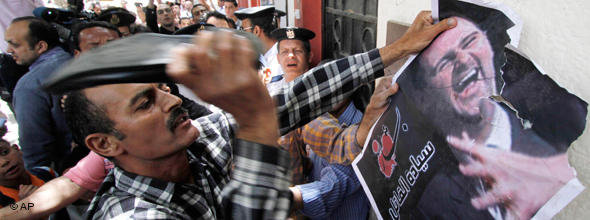The Scope of Revolution
Does social fragmentation make democratic change impossible in a country like Syria?
Martin Beck: I would not make things that easy for autocrat rulers who like to present themselves as the only alternative to chaos. Yes, there are religious and ethnic tensions. And the arbitrary demarcation of borders in colonial times has certainly not served the purpose of developing national identities. But that does not mean that Tunisia and Egypt are the only places where the call for democracy makes sense.
How does democratisation impact on stability?
Beck: Initially, democratisation certainly means a degree of destabilisation because it allows new forces to articulate views while institutions conducive to compromise-building still need to be established. The Western desire for the simultaneous existence of democracy and stability can only be fulfilled in the long run; in the short run, it is rather a paradox.
In April, we are watching the Syrian regime use force to suppress protests. The country's military is something of an Alevi militia. Most of the officer corps – like President Bashar al-Assad himself – belong to this Shia sect. So unlike Egypt, the army does not symbolise the unity of the nation; it is defending the interests of a specific group.

Beck: Nonetheless, it would be wrong to consider Syria an Alavi dictatorship. The regime has involved other groups in the past, especially groups from a Sunni background. Its ability to hold on to power has been attributed to a complex mix of repression and cooptation. But now it is experiencing the legitimacy problems that are typical of authoritarian rule – the conspicuous absence of freedom and the lack of socioeconomic development.
But weren't there sectarian motives when Assad's father Hafez al-Assad ordered the violent suppression of the Sunni community at Hama in 1982?
Beck: That was an act by a secular regime. It wanted to nip the politicised Islamist opposition in the bud. That was about politics, not religion.
Syria supports the Shia Hezbollah in Lebanon. To what extent does an organisation like that depend on its members' religious feelings?
Beck: Communal interests mark politics in Lebanon and other countries in the region. People belong to communities for their entire lives. They are born into them and share their interests. Whether someone is deeply religious or not does not matter much in politics. In Lebanon, Christians, Sunnis, Shias and other religious communities have formed political parties.

Even so, the country is not a pluralistic democracy.
Beck: No, not really. It is pluralistic, but not a real democracy. The highly armed Hezbollah has created something of a state within the state. And there are other problems as well. Lebanon's electoral law, for example, is biased towards the Christians. In "good" times, the elites of the various religious communities reach compromises; in bad times, the country is on the brink of disintegration into civil war.
And Hezbollah pursues its own aggressive foreign policy towards Israel. Is railing against an external enemy an effective way to win support?
Beck: Israel is extremely unpopular throughout the Arab world and Hezbollah is not alone in exploiting such resentments. Many political actors in Arab countries use the same approach in attempts to boost legitimacy – but Hezbollah is in the position to do so with particular credibility.
Jordan does not play that game; it has signed a peace treaty with Israel.
Beck: Yes, and because the peace agreement is unpopular, it poses something of a domestic policy challenge to King Abdullah II. Nonetheless, recent protests in Jordan were comparatively mild. The reason is that, unlike Syria, Jordan's authoritarian system has channels to legally express opposition views. And while the country does face a lot of problems, the scope for socioeconomic development is better.
How do you rate the chances for democracy in Jordan? Protest marches have been staged and the cabinet has been replaced. At first sight, that looks like Syria.
Beck: But the situation is quite different. So far, at any rate, the regime has managed to curb protests by setting out a vague top-down reform agenda – although, in informed circles, there is scepticism about the readiness to embrace real reforms. The mood in Jordan is not at all like the euphoria of a new beginning in Egypt, and the country is not anywhere near a genuine process of democratisation.

Why is that so?
Beck: The monarchy in Jordan is not really in question. The most radical demands are made by the Islamic Action Front, an offshoot of Egypt's Muslim Brotherhood, and the only party with any real clout. It calls for a constitutional monarchy. It also wants a democratisation of the election law to improve representation for Jordanians of Palestinian origin and create opportunities for the development of political parties. Civic groups are also campaigning for genuine representation and opportunities for more political participation.
At the same time, however, the monarchy enjoys genuine support. Jordan is a complicated society and the difference between the old-established 'Transjordanians' and the Palestinians is overlaid with a host of other fault lines. What is more, many Jordanians of Palestinian origin have worked their way up and have a great deal to lose. Many Jordanians are afraid that, without the monarchy, the country would disintegrate.
We have already mentioned Christians in Lebanon, but what about Christians in Jordan and Syria?
Beck: In both countries, their communities are much smaller than in Lebanon. Many Christians belong to the middle and upper-middle classes because they are well educated. Christians are not persecuted, but opportunities for personal development are limited in authoritarian systems. This limitation applies to everyone, but many Christians, due to their high personal potential, feel the restrictions more acutely than most. Syria is witnessing a creeping exodus of Christians. The cause, however, is the lack of prospects, not religious intolerance or persecution.
Shia fundamentalists identify with Iran and Sunni fundamentalists with Saudi Arabia. Do the two countries exert an influence on events beyond their own borders?
Beck: Yes they do, and they find it easiest in Lebanon, where the central government is weak and individual groups are open to support from outside. But Western influence on Lebanon is also considerable. The same applies to Jordan, which depends on development aid and budget support.
Interview: Hans Dombrowski
© Development and Cooperation 2011
Martin Beck currently on leave as a senior fellow at the GIGA Institute for Middle East Studies, has been the resident representative of the Konrad Adenauer Foundation in Amman since 2010. His area of responsibility covers Jordan, Syria, Lebanon and Iraq.
Editor: Lewis Gropp/Qantara.de
